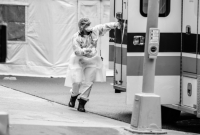Support strong Canadian climate journalism for 2025
Donald Trump's re-election efforts appear to be showing new signs of life despite lingering concerns about whether the accelerated reopening in parts of the United States could prompt a second wave of the novel coronavirus.
Those marathon White House task force briefings, a fixture at the height of the COVID-19 pandemic last month, have all but disappeared, done in at least partly by the president's disastrous musings about UV light and disinfectants as potential treatments.
Press secretary Kayleigh McEnany has taken over podium duties while Trump, keen to get back on the campaign trail, takes tentative steps outside the national capital, most recently in Arizona. There, his visit to a Honeywell mask-making facility bore many of the familiar hallmarks of a Trump campaign rally.
This time, however, it's the American economy he wants to make great again — and the outcome of the vote in November likely depends on it.
"Right now, it does not redound to his benefit at all, but his hope is for a strong recovery by the time it matters for the election," said Paul Beck, a professor of politics at Ohio State University in Columbus.
"That is why he is pushing for early opening, though with rhetoric that attempts to protect himself if that opening goes badly."
That includes new references to Americans as "warriors," a term both McEnany and the self-described "wartime president" have used in recent days, in the fight against COVID-19 — a turn of phrase that has some wondering whether Trump is bracing voters for the likelihood that U.S. residents are putting themselves in harm's way as the country continues to reopen.
"They said, 'We have to close our country.' Well, now it's time to open it up," Trump said this week.
"And you know what? The people of our country are warriors, and I'm looking at it. I'm not saying anything is perfect. And, yes, will some people be affected? Yes. Will some people be affected badly? Yes. But we have to get our country open, and we have to get it open soon."
Here's why: a new Monmouth University poll out Wednesday suggested Trump has been losing ground to Joe Biden, even as the presumptive Democratic nominee contends with a historic allegation of sexual assault and a campaign that's been relegated to fundraising emails and videoconference calls.
Respondents to the poll conducted late last week gave Biden 50 per cent of the decided vote, compared with 41 per cent for Trump — a significantly wider gap than the 48 per cent to 44 per cent ratio reported in April. The poll carries a margin of error of 3.6 percentage points, 19 times out of 20.
The gap narrowed slightly when Justin Amash, a Michigan congressman and former Republican who's planning a run under the Libertarian banner, is added to the mix: support for Biden dropped to 47 per cent and Trump to 40 per cent, with Amash at five per cent.
At those levels, and with third-party candidates having a history of being largely ignored on the presidential ballot, it hardly seems like Amash could play a spoiler role. But in critical battleground states like Michigan, Pennsylvania and Wisconsin, where the margin is expected to be razor-thin, his presence could have a considerable impact.
Ohio, too — the Rust Belt state Trump has said he plans to visit next.
"The choices of Arizona and Ohio are not accidents — these are two states that are seen as swing states, and Arizona seems to be in play," said Capri Cafaro, a former Ohio senator and executive in residence at the American University School of Public Affairs in Washington, D.C.
"Obviously, it seems as if there is a great desire on behalf of the president to get out of Washington to resume his time on the campaign trail as much as possible, given the circumstances. That's really where his comfort zone is, where he's in his natural habitat."
Cafaro also takes issue with the conventional political wisdom that says Trump is doomed at the ballot box over the way his administration has handled the public health crisis aspect of the pandemic. Much of the hand-wringing over Trump's performances at the briefings, feuds with the press and initial response to COVID-19 has been in the media and among those who never supported him in the first place, she noted.
Consider, as well, that the decisions that had the most impact on the lives of Americans were taken at the state level, thanks to the lack of a co-ordinated federal response, which could allow Trump to shift the blame to the governors.
"I think part of that was a bit by design, because if things went wrong, there's somebody else to blame," she said. "But I think because of that, it's a little bit more difficult to pin either the success or the blame on President Trump."
This report by The Canadian Press was first published May 7, 2020.




Comments